Sociology: Childhood as a Socially Constructed Category Essay
VerifiedAdded on 2022/08/13
|8
|2103
|13
Essay
AI Summary
This essay delves into the sociological perspective that childhood is a social construct, arguing that the meaning and experience of childhood are not universal or fixed but are shaped by societal, cultural, and historical contexts. It examines how various factors, including race, ethnicity, gender, disability, and class, influence the expectations and roles assigned to children. The essay explores the evolution of childhood across time and cultures, highlighting how societal values, parental expectations, and cultural practices impact children's development and experiences. It emphasizes that childhood is not solely a biological phase but a period heavily influenced by social constructs that control children's actions and shape their contributions to society. The essay also discusses how the social construct of childhood affects children's dependency, socialization, and the expectations placed on them, concluding that childhood experiences significantly influence a person's personality, character, and understanding of the world.
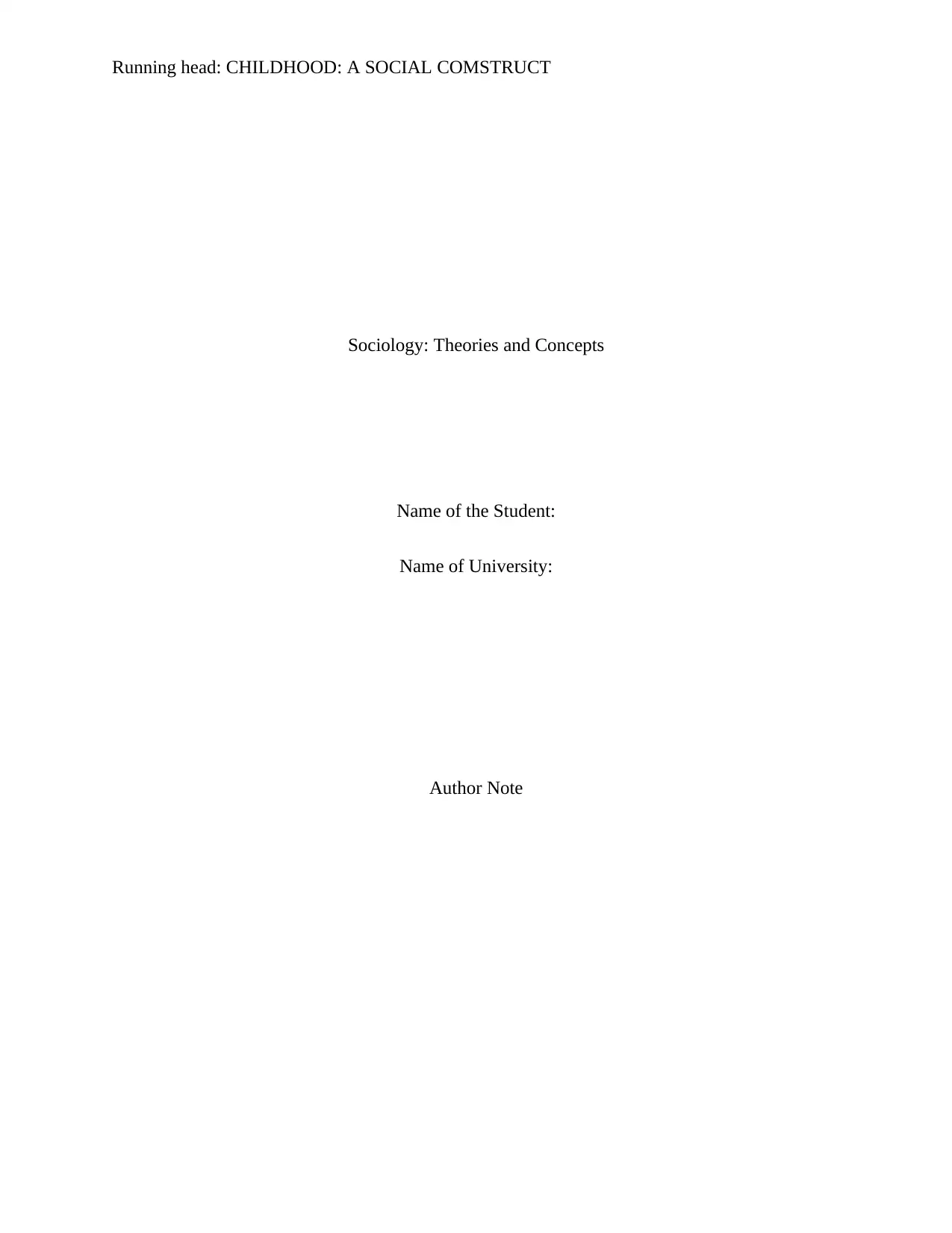
Running head: CHILDHOOD: A SOCIAL COMSTRUCT
Sociology: Theories and Concepts
Name of the Student:
Name of University:
Author Note
Sociology: Theories and Concepts
Name of the Student:
Name of University:
Author Note
Paraphrase This Document
Need a fresh take? Get an instant paraphrase of this document with our AI Paraphraser
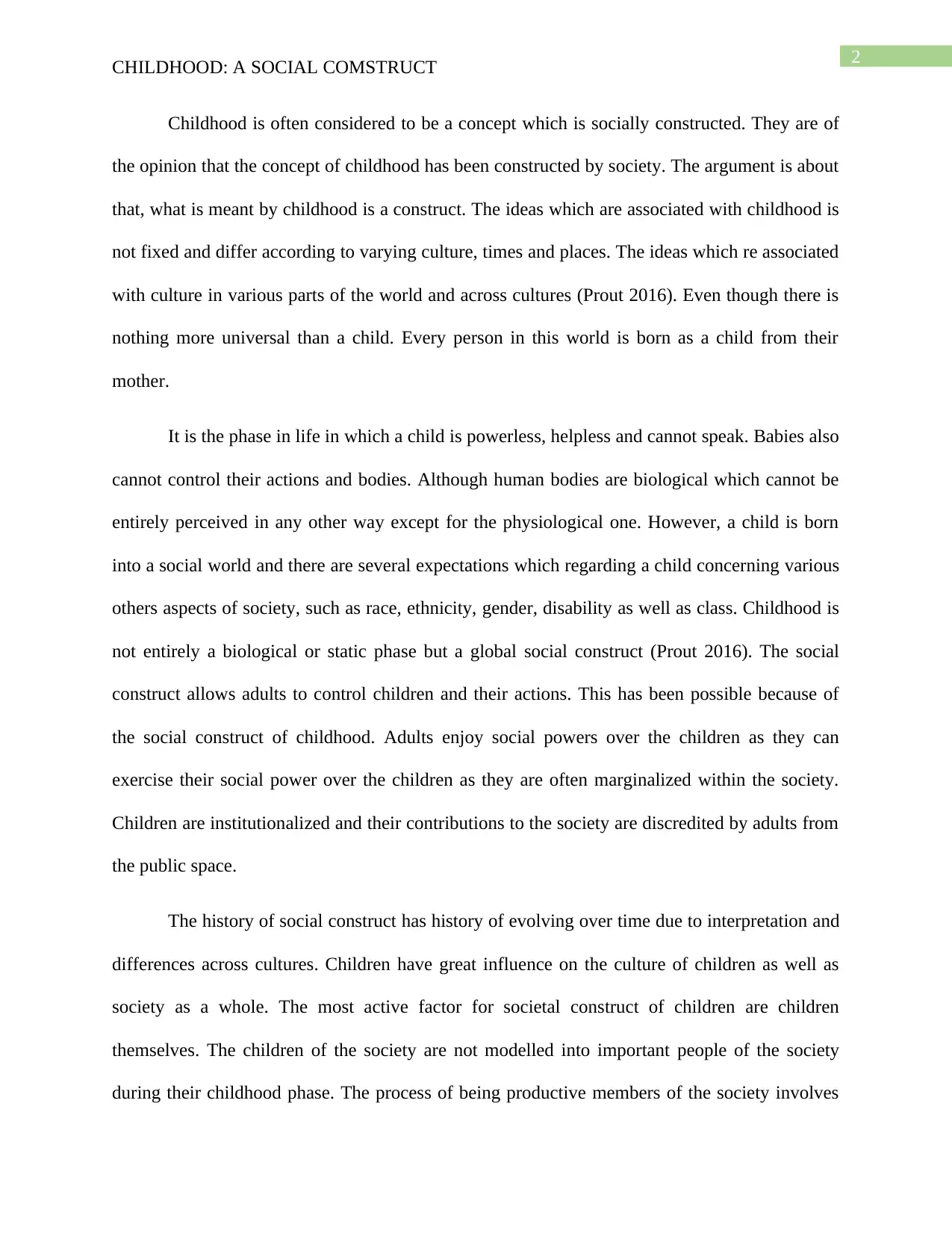
2
CHILDHOOD: A SOCIAL COMSTRUCT
Childhood is often considered to be a concept which is socially constructed. They are of
the opinion that the concept of childhood has been constructed by society. The argument is about
that, what is meant by childhood is a construct. The ideas which are associated with childhood is
not fixed and differ according to varying culture, times and places. The ideas which re associated
with culture in various parts of the world and across cultures (Prout 2016). Even though there is
nothing more universal than a child. Every person in this world is born as a child from their
mother.
It is the phase in life in which a child is powerless, helpless and cannot speak. Babies also
cannot control their actions and bodies. Although human bodies are biological which cannot be
entirely perceived in any other way except for the physiological one. However, a child is born
into a social world and there are several expectations which regarding a child concerning various
others aspects of society, such as race, ethnicity, gender, disability as well as class. Childhood is
not entirely a biological or static phase but a global social construct (Prout 2016). The social
construct allows adults to control children and their actions. This has been possible because of
the social construct of childhood. Adults enjoy social powers over the children as they can
exercise their social power over the children as they are often marginalized within the society.
Children are institutionalized and their contributions to the society are discredited by adults from
the public space.
The history of social construct has history of evolving over time due to interpretation and
differences across cultures. Children have great influence on the culture of children as well as
society as a whole. The most active factor for societal construct of children are children
themselves. The children of the society are not modelled into important people of the society
during their childhood phase. The process of being productive members of the society involves
CHILDHOOD: A SOCIAL COMSTRUCT
Childhood is often considered to be a concept which is socially constructed. They are of
the opinion that the concept of childhood has been constructed by society. The argument is about
that, what is meant by childhood is a construct. The ideas which are associated with childhood is
not fixed and differ according to varying culture, times and places. The ideas which re associated
with culture in various parts of the world and across cultures (Prout 2016). Even though there is
nothing more universal than a child. Every person in this world is born as a child from their
mother.
It is the phase in life in which a child is powerless, helpless and cannot speak. Babies also
cannot control their actions and bodies. Although human bodies are biological which cannot be
entirely perceived in any other way except for the physiological one. However, a child is born
into a social world and there are several expectations which regarding a child concerning various
others aspects of society, such as race, ethnicity, gender, disability as well as class. Childhood is
not entirely a biological or static phase but a global social construct (Prout 2016). The social
construct allows adults to control children and their actions. This has been possible because of
the social construct of childhood. Adults enjoy social powers over the children as they can
exercise their social power over the children as they are often marginalized within the society.
Children are institutionalized and their contributions to the society are discredited by adults from
the public space.
The history of social construct has history of evolving over time due to interpretation and
differences across cultures. Children have great influence on the culture of children as well as
society as a whole. The most active factor for societal construct of children are children
themselves. The children of the society are not modelled into important people of the society
during their childhood phase. The process of being productive members of the society involves
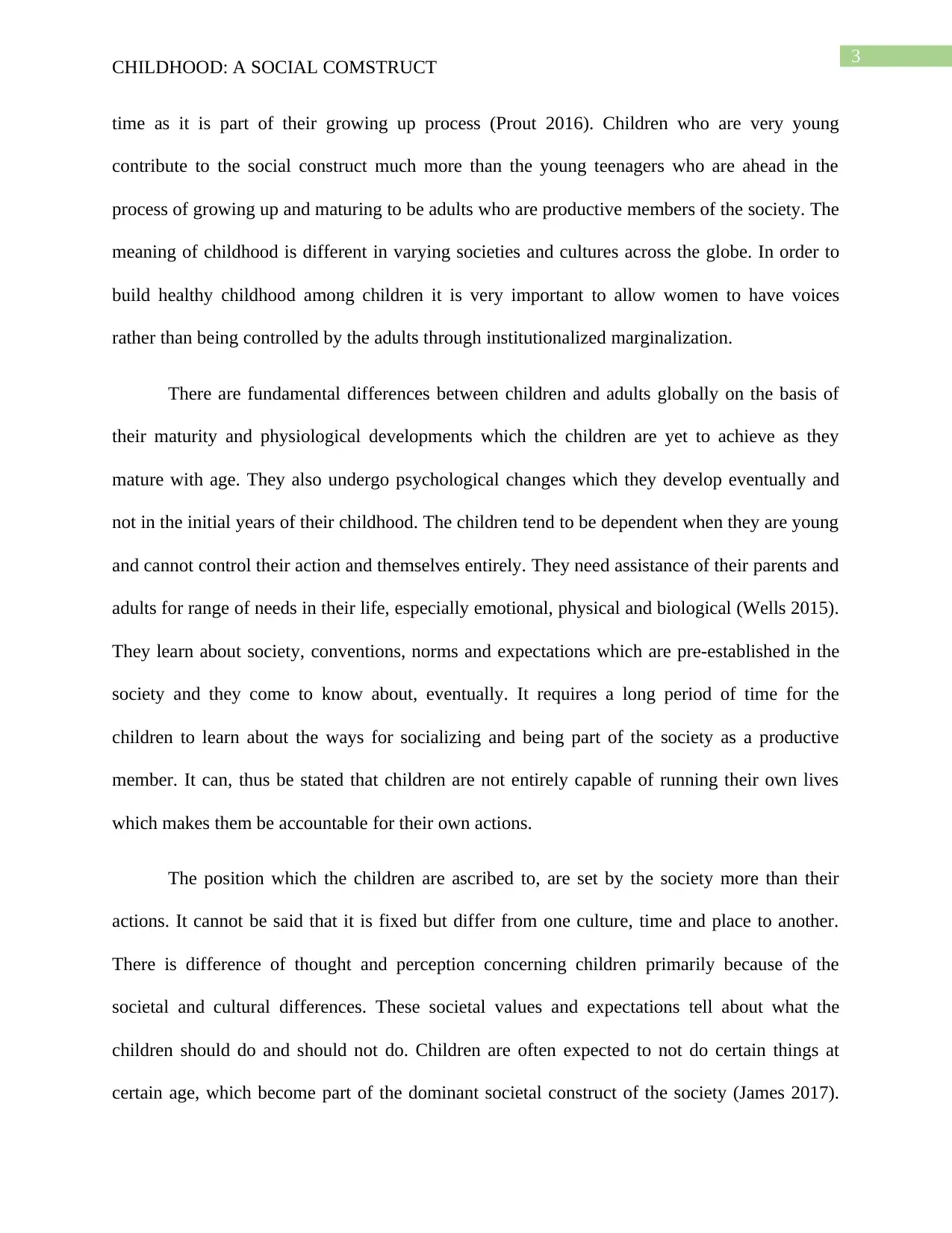
3
CHILDHOOD: A SOCIAL COMSTRUCT
time as it is part of their growing up process (Prout 2016). Children who are very young
contribute to the social construct much more than the young teenagers who are ahead in the
process of growing up and maturing to be adults who are productive members of the society. The
meaning of childhood is different in varying societies and cultures across the globe. In order to
build healthy childhood among children it is very important to allow women to have voices
rather than being controlled by the adults through institutionalized marginalization.
There are fundamental differences between children and adults globally on the basis of
their maturity and physiological developments which the children are yet to achieve as they
mature with age. They also undergo psychological changes which they develop eventually and
not in the initial years of their childhood. The children tend to be dependent when they are young
and cannot control their action and themselves entirely. They need assistance of their parents and
adults for range of needs in their life, especially emotional, physical and biological (Wells 2015).
They learn about society, conventions, norms and expectations which are pre-established in the
society and they come to know about, eventually. It requires a long period of time for the
children to learn about the ways for socializing and being part of the society as a productive
member. It can, thus be stated that children are not entirely capable of running their own lives
which makes them be accountable for their own actions.
The position which the children are ascribed to, are set by the society more than their
actions. It cannot be said that it is fixed but differ from one culture, time and place to another.
There is difference of thought and perception concerning children primarily because of the
societal and cultural differences. These societal values and expectations tell about what the
children should do and should not do. Children are often expected to not do certain things at
certain age, which become part of the dominant societal construct of the society (James 2017).
CHILDHOOD: A SOCIAL COMSTRUCT
time as it is part of their growing up process (Prout 2016). Children who are very young
contribute to the social construct much more than the young teenagers who are ahead in the
process of growing up and maturing to be adults who are productive members of the society. The
meaning of childhood is different in varying societies and cultures across the globe. In order to
build healthy childhood among children it is very important to allow women to have voices
rather than being controlled by the adults through institutionalized marginalization.
There are fundamental differences between children and adults globally on the basis of
their maturity and physiological developments which the children are yet to achieve as they
mature with age. They also undergo psychological changes which they develop eventually and
not in the initial years of their childhood. The children tend to be dependent when they are young
and cannot control their action and themselves entirely. They need assistance of their parents and
adults for range of needs in their life, especially emotional, physical and biological (Wells 2015).
They learn about society, conventions, norms and expectations which are pre-established in the
society and they come to know about, eventually. It requires a long period of time for the
children to learn about the ways for socializing and being part of the society as a productive
member. It can, thus be stated that children are not entirely capable of running their own lives
which makes them be accountable for their own actions.
The position which the children are ascribed to, are set by the society more than their
actions. It cannot be said that it is fixed but differ from one culture, time and place to another.
There is difference of thought and perception concerning children primarily because of the
societal and cultural differences. These societal values and expectations tell about what the
children should do and should not do. Children are often expected to not do certain things at
certain age, which become part of the dominant societal construct of the society (James 2017).
⊘ This is a preview!⊘
Do you want full access?
Subscribe today to unlock all pages.

Trusted by 1+ million students worldwide
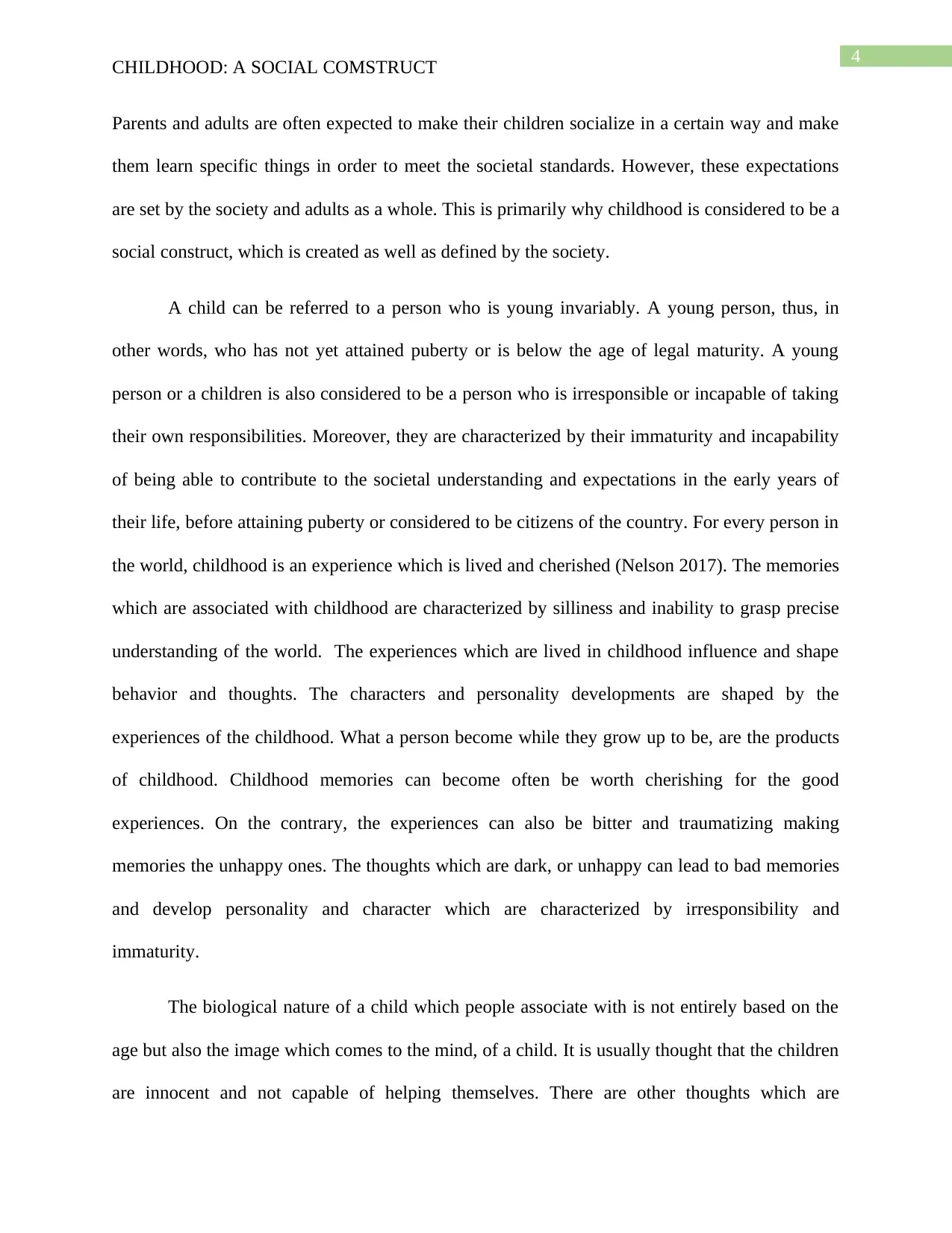
4
CHILDHOOD: A SOCIAL COMSTRUCT
Parents and adults are often expected to make their children socialize in a certain way and make
them learn specific things in order to meet the societal standards. However, these expectations
are set by the society and adults as a whole. This is primarily why childhood is considered to be a
social construct, which is created as well as defined by the society.
A child can be referred to a person who is young invariably. A young person, thus, in
other words, who has not yet attained puberty or is below the age of legal maturity. A young
person or a children is also considered to be a person who is irresponsible or incapable of taking
their own responsibilities. Moreover, they are characterized by their immaturity and incapability
of being able to contribute to the societal understanding and expectations in the early years of
their life, before attaining puberty or considered to be citizens of the country. For every person in
the world, childhood is an experience which is lived and cherished (Nelson 2017). The memories
which are associated with childhood are characterized by silliness and inability to grasp precise
understanding of the world. The experiences which are lived in childhood influence and shape
behavior and thoughts. The characters and personality developments are shaped by the
experiences of the childhood. What a person become while they grow up to be, are the products
of childhood. Childhood memories can become often be worth cherishing for the good
experiences. On the contrary, the experiences can also be bitter and traumatizing making
memories the unhappy ones. The thoughts which are dark, or unhappy can lead to bad memories
and develop personality and character which are characterized by irresponsibility and
immaturity.
The biological nature of a child which people associate with is not entirely based on the
age but also the image which comes to the mind, of a child. It is usually thought that the children
are innocent and not capable of helping themselves. There are other thoughts which are
CHILDHOOD: A SOCIAL COMSTRUCT
Parents and adults are often expected to make their children socialize in a certain way and make
them learn specific things in order to meet the societal standards. However, these expectations
are set by the society and adults as a whole. This is primarily why childhood is considered to be a
social construct, which is created as well as defined by the society.
A child can be referred to a person who is young invariably. A young person, thus, in
other words, who has not yet attained puberty or is below the age of legal maturity. A young
person or a children is also considered to be a person who is irresponsible or incapable of taking
their own responsibilities. Moreover, they are characterized by their immaturity and incapability
of being able to contribute to the societal understanding and expectations in the early years of
their life, before attaining puberty or considered to be citizens of the country. For every person in
the world, childhood is an experience which is lived and cherished (Nelson 2017). The memories
which are associated with childhood are characterized by silliness and inability to grasp precise
understanding of the world. The experiences which are lived in childhood influence and shape
behavior and thoughts. The characters and personality developments are shaped by the
experiences of the childhood. What a person become while they grow up to be, are the products
of childhood. Childhood memories can become often be worth cherishing for the good
experiences. On the contrary, the experiences can also be bitter and traumatizing making
memories the unhappy ones. The thoughts which are dark, or unhappy can lead to bad memories
and develop personality and character which are characterized by irresponsibility and
immaturity.
The biological nature of a child which people associate with is not entirely based on the
age but also the image which comes to the mind, of a child. It is usually thought that the children
are innocent and not capable of helping themselves. There are other thoughts which are
Paraphrase This Document
Need a fresh take? Get an instant paraphrase of this document with our AI Paraphraser
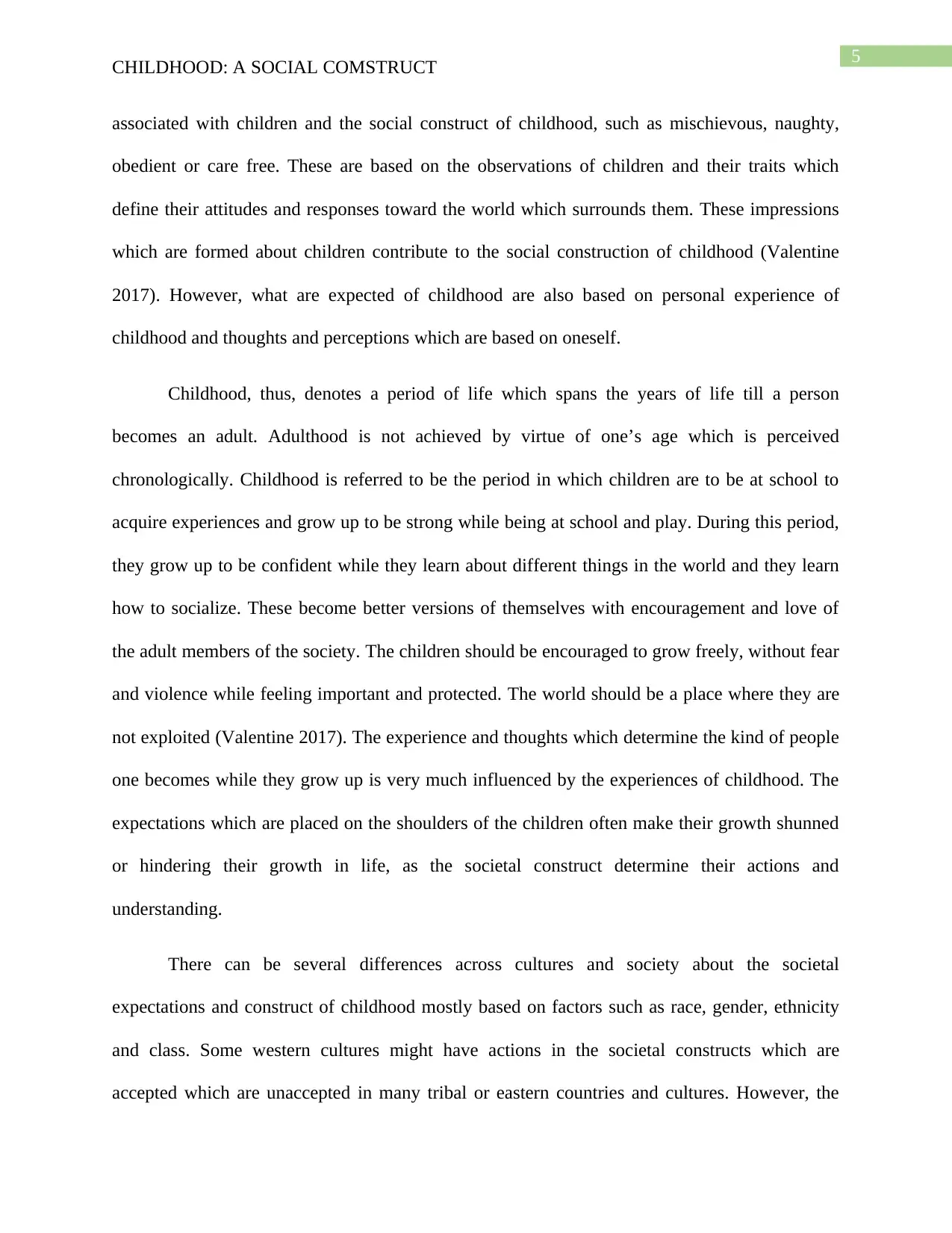
5
CHILDHOOD: A SOCIAL COMSTRUCT
associated with children and the social construct of childhood, such as mischievous, naughty,
obedient or care free. These are based on the observations of children and their traits which
define their attitudes and responses toward the world which surrounds them. These impressions
which are formed about children contribute to the social construction of childhood (Valentine
2017). However, what are expected of childhood are also based on personal experience of
childhood and thoughts and perceptions which are based on oneself.
Childhood, thus, denotes a period of life which spans the years of life till a person
becomes an adult. Adulthood is not achieved by virtue of one’s age which is perceived
chronologically. Childhood is referred to be the period in which children are to be at school to
acquire experiences and grow up to be strong while being at school and play. During this period,
they grow up to be confident while they learn about different things in the world and they learn
how to socialize. These become better versions of themselves with encouragement and love of
the adult members of the society. The children should be encouraged to grow freely, without fear
and violence while feeling important and protected. The world should be a place where they are
not exploited (Valentine 2017). The experience and thoughts which determine the kind of people
one becomes while they grow up is very much influenced by the experiences of childhood. The
expectations which are placed on the shoulders of the children often make their growth shunned
or hindering their growth in life, as the societal construct determine their actions and
understanding.
There can be several differences across cultures and society about the societal
expectations and construct of childhood mostly based on factors such as race, gender, ethnicity
and class. Some western cultures might have actions in the societal constructs which are
accepted which are unaccepted in many tribal or eastern countries and cultures. However, the
CHILDHOOD: A SOCIAL COMSTRUCT
associated with children and the social construct of childhood, such as mischievous, naughty,
obedient or care free. These are based on the observations of children and their traits which
define their attitudes and responses toward the world which surrounds them. These impressions
which are formed about children contribute to the social construction of childhood (Valentine
2017). However, what are expected of childhood are also based on personal experience of
childhood and thoughts and perceptions which are based on oneself.
Childhood, thus, denotes a period of life which spans the years of life till a person
becomes an adult. Adulthood is not achieved by virtue of one’s age which is perceived
chronologically. Childhood is referred to be the period in which children are to be at school to
acquire experiences and grow up to be strong while being at school and play. During this period,
they grow up to be confident while they learn about different things in the world and they learn
how to socialize. These become better versions of themselves with encouragement and love of
the adult members of the society. The children should be encouraged to grow freely, without fear
and violence while feeling important and protected. The world should be a place where they are
not exploited (Valentine 2017). The experience and thoughts which determine the kind of people
one becomes while they grow up is very much influenced by the experiences of childhood. The
expectations which are placed on the shoulders of the children often make their growth shunned
or hindering their growth in life, as the societal construct determine their actions and
understanding.
There can be several differences across cultures and society about the societal
expectations and construct of childhood mostly based on factors such as race, gender, ethnicity
and class. Some western cultures might have actions in the societal constructs which are
accepted which are unaccepted in many tribal or eastern countries and cultures. However, the
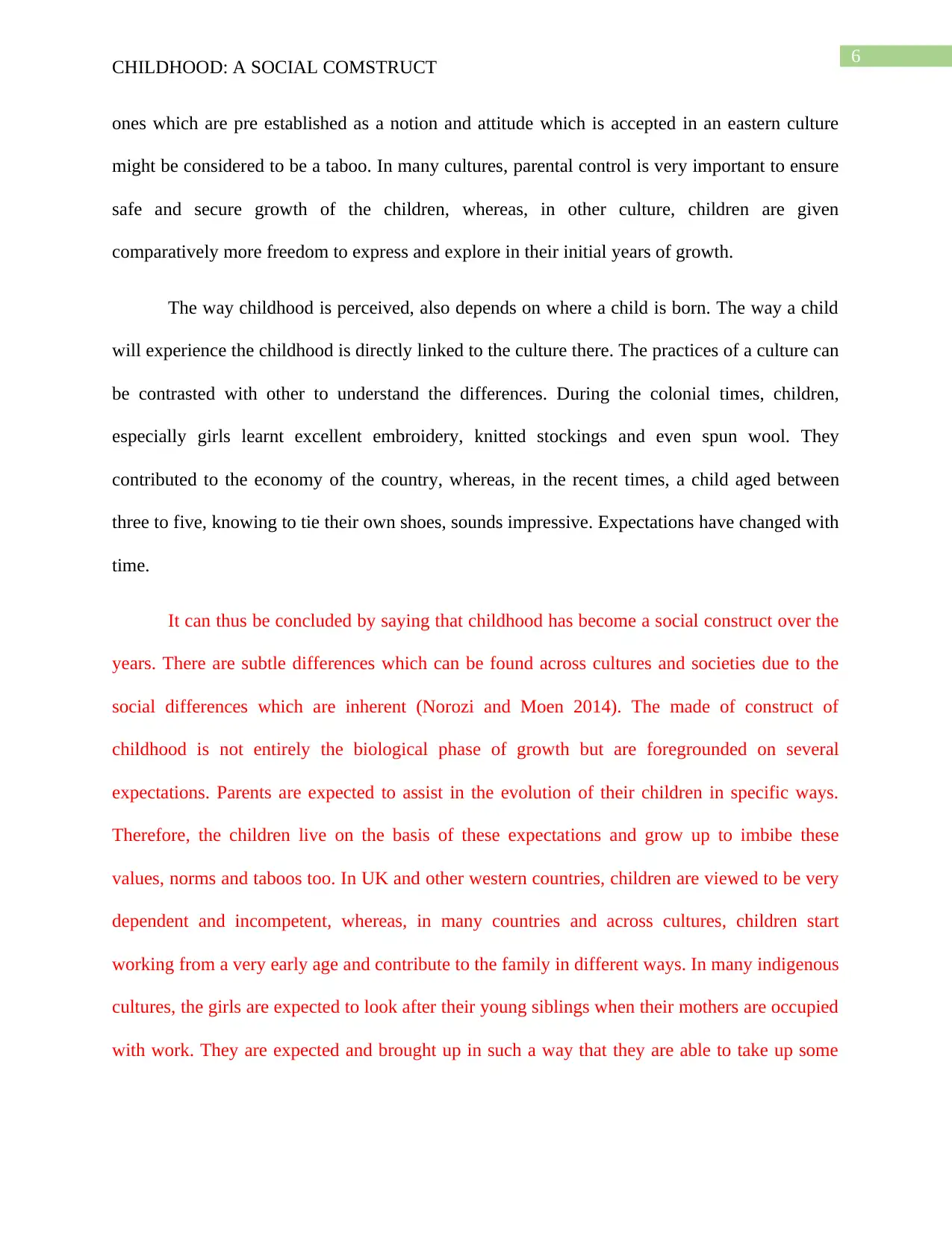
6
CHILDHOOD: A SOCIAL COMSTRUCT
ones which are pre established as a notion and attitude which is accepted in an eastern culture
might be considered to be a taboo. In many cultures, parental control is very important to ensure
safe and secure growth of the children, whereas, in other culture, children are given
comparatively more freedom to express and explore in their initial years of growth.
The way childhood is perceived, also depends on where a child is born. The way a child
will experience the childhood is directly linked to the culture there. The practices of a culture can
be contrasted with other to understand the differences. During the colonial times, children,
especially girls learnt excellent embroidery, knitted stockings and even spun wool. They
contributed to the economy of the country, whereas, in the recent times, a child aged between
three to five, knowing to tie their own shoes, sounds impressive. Expectations have changed with
time.
It can thus be concluded by saying that childhood has become a social construct over the
years. There are subtle differences which can be found across cultures and societies due to the
social differences which are inherent (Norozi and Moen 2014). The made of construct of
childhood is not entirely the biological phase of growth but are foregrounded on several
expectations. Parents are expected to assist in the evolution of their children in specific ways.
Therefore, the children live on the basis of these expectations and grow up to imbibe these
values, norms and taboos too. In UK and other western countries, children are viewed to be very
dependent and incompetent, whereas, in many countries and across cultures, children start
working from a very early age and contribute to the family in different ways. In many indigenous
cultures, the girls are expected to look after their young siblings when their mothers are occupied
with work. They are expected and brought up in such a way that they are able to take up some
CHILDHOOD: A SOCIAL COMSTRUCT
ones which are pre established as a notion and attitude which is accepted in an eastern culture
might be considered to be a taboo. In many cultures, parental control is very important to ensure
safe and secure growth of the children, whereas, in other culture, children are given
comparatively more freedom to express and explore in their initial years of growth.
The way childhood is perceived, also depends on where a child is born. The way a child
will experience the childhood is directly linked to the culture there. The practices of a culture can
be contrasted with other to understand the differences. During the colonial times, children,
especially girls learnt excellent embroidery, knitted stockings and even spun wool. They
contributed to the economy of the country, whereas, in the recent times, a child aged between
three to five, knowing to tie their own shoes, sounds impressive. Expectations have changed with
time.
It can thus be concluded by saying that childhood has become a social construct over the
years. There are subtle differences which can be found across cultures and societies due to the
social differences which are inherent (Norozi and Moen 2014). The made of construct of
childhood is not entirely the biological phase of growth but are foregrounded on several
expectations. Parents are expected to assist in the evolution of their children in specific ways.
Therefore, the children live on the basis of these expectations and grow up to imbibe these
values, norms and taboos too. In UK and other western countries, children are viewed to be very
dependent and incompetent, whereas, in many countries and across cultures, children start
working from a very early age and contribute to the family in different ways. In many indigenous
cultures, the girls are expected to look after their young siblings when their mothers are occupied
with work. They are expected and brought up in such a way that they are able to take up some
⊘ This is a preview!⊘
Do you want full access?
Subscribe today to unlock all pages.

Trusted by 1+ million students worldwide
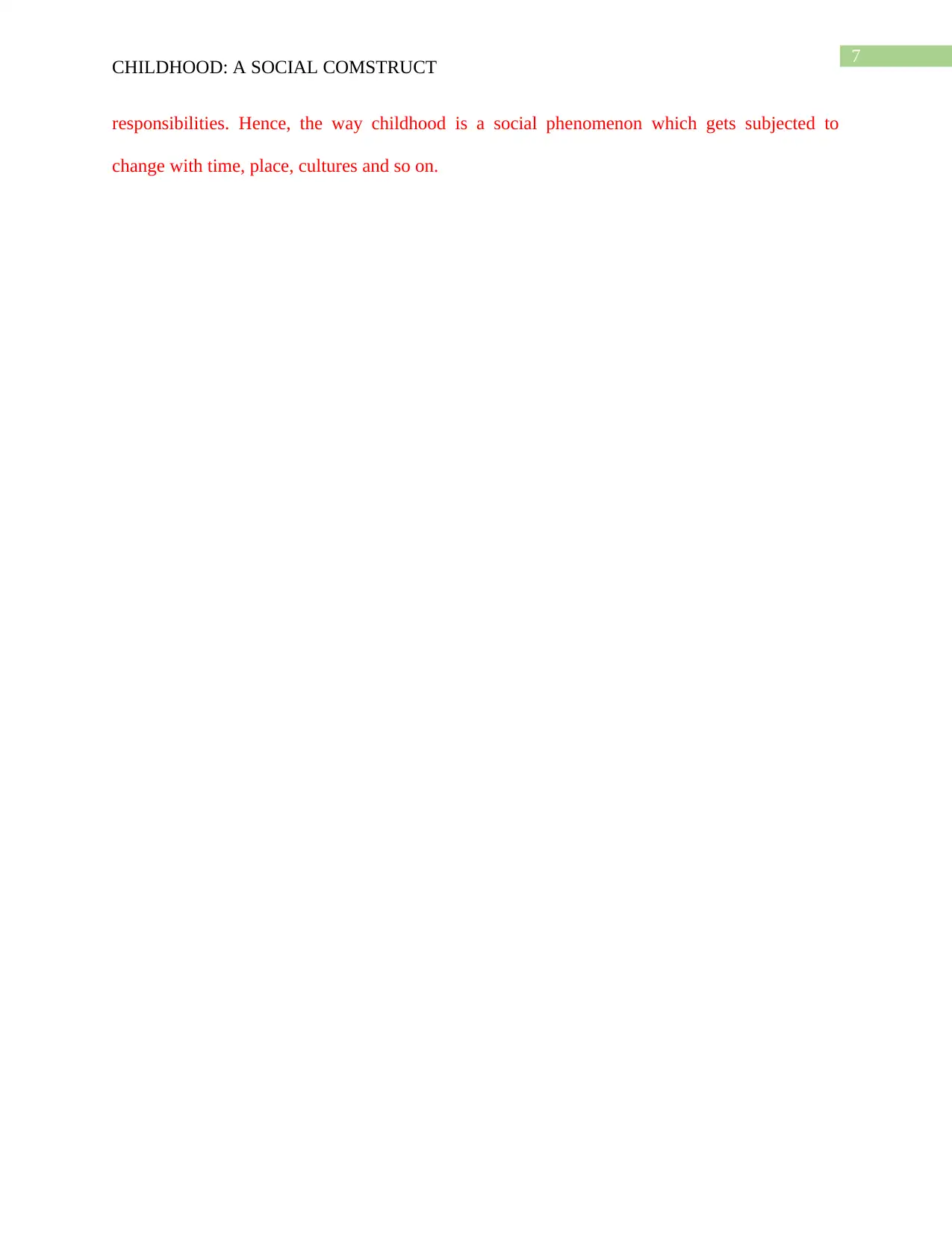
7
CHILDHOOD: A SOCIAL COMSTRUCT
responsibilities. Hence, the way childhood is a social phenomenon which gets subjected to
change with time, place, cultures and so on.
CHILDHOOD: A SOCIAL COMSTRUCT
responsibilities. Hence, the way childhood is a social phenomenon which gets subjected to
change with time, place, cultures and so on.
Paraphrase This Document
Need a fresh take? Get an instant paraphrase of this document with our AI Paraphraser
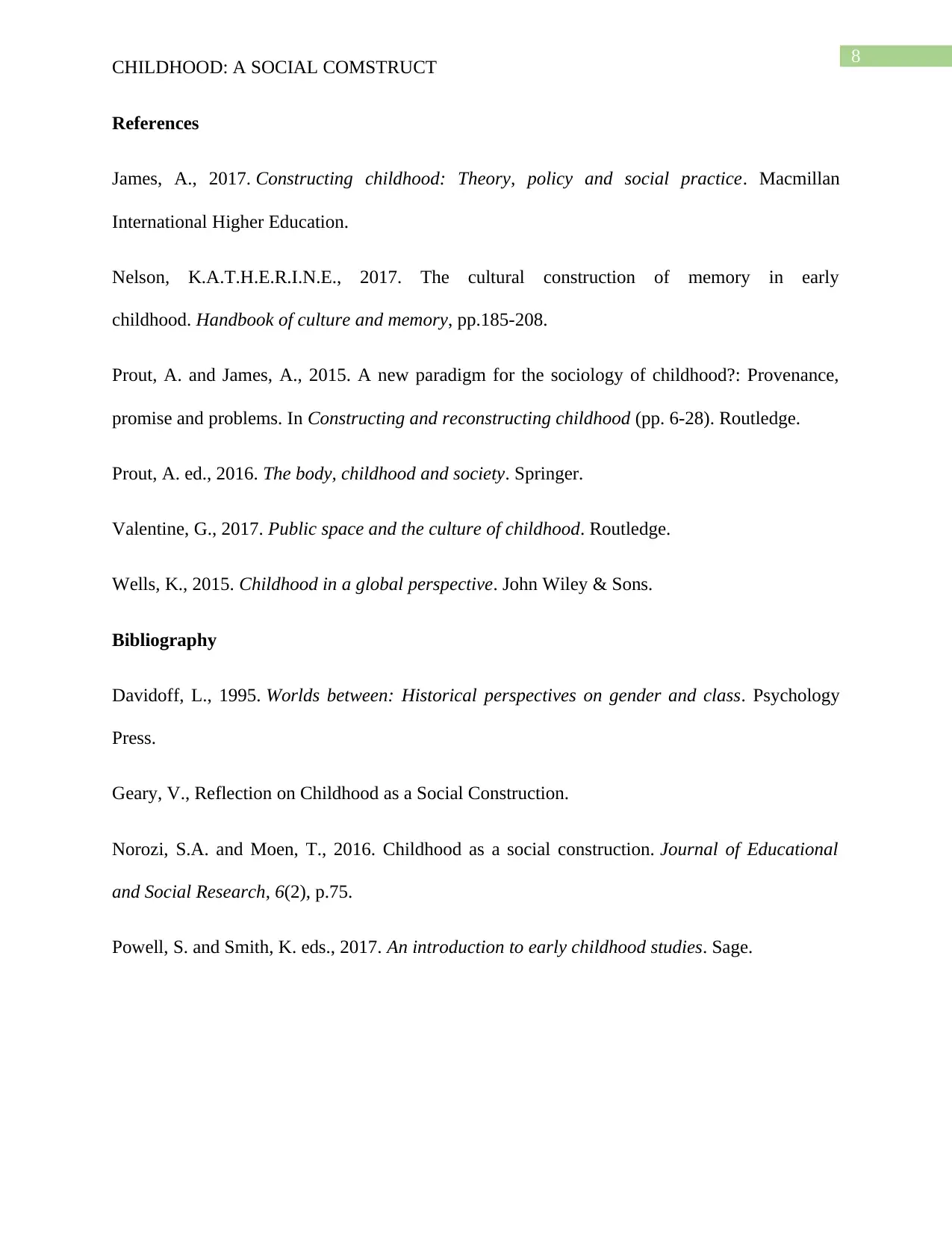
8
CHILDHOOD: A SOCIAL COMSTRUCT
References
James, A., 2017. Constructing childhood: Theory, policy and social practice. Macmillan
International Higher Education.
Nelson, K.A.T.H.E.R.I.N.E., 2017. The cultural construction of memory in early
childhood. Handbook of culture and memory, pp.185-208.
Prout, A. and James, A., 2015. A new paradigm for the sociology of childhood?: Provenance,
promise and problems. In Constructing and reconstructing childhood (pp. 6-28). Routledge.
Prout, A. ed., 2016. The body, childhood and society. Springer.
Valentine, G., 2017. Public space and the culture of childhood. Routledge.
Wells, K., 2015. Childhood in a global perspective. John Wiley & Sons.
Bibliography
Davidoff, L., 1995. Worlds between: Historical perspectives on gender and class. Psychology
Press.
Geary, V., Reflection on Childhood as a Social Construction.
Norozi, S.A. and Moen, T., 2016. Childhood as a social construction. Journal of Educational
and Social Research, 6(2), p.75.
Powell, S. and Smith, K. eds., 2017. An introduction to early childhood studies. Sage.
CHILDHOOD: A SOCIAL COMSTRUCT
References
James, A., 2017. Constructing childhood: Theory, policy and social practice. Macmillan
International Higher Education.
Nelson, K.A.T.H.E.R.I.N.E., 2017. The cultural construction of memory in early
childhood. Handbook of culture and memory, pp.185-208.
Prout, A. and James, A., 2015. A new paradigm for the sociology of childhood?: Provenance,
promise and problems. In Constructing and reconstructing childhood (pp. 6-28). Routledge.
Prout, A. ed., 2016. The body, childhood and society. Springer.
Valentine, G., 2017. Public space and the culture of childhood. Routledge.
Wells, K., 2015. Childhood in a global perspective. John Wiley & Sons.
Bibliography
Davidoff, L., 1995. Worlds between: Historical perspectives on gender and class. Psychology
Press.
Geary, V., Reflection on Childhood as a Social Construction.
Norozi, S.A. and Moen, T., 2016. Childhood as a social construction. Journal of Educational
and Social Research, 6(2), p.75.
Powell, S. and Smith, K. eds., 2017. An introduction to early childhood studies. Sage.
1 out of 8
Related Documents
Your All-in-One AI-Powered Toolkit for Academic Success.
+13062052269
info@desklib.com
Available 24*7 on WhatsApp / Email
![[object Object]](/_next/static/media/star-bottom.7253800d.svg)
Unlock your academic potential
Copyright © 2020–2026 A2Z Services. All Rights Reserved. Developed and managed by ZUCOL.





